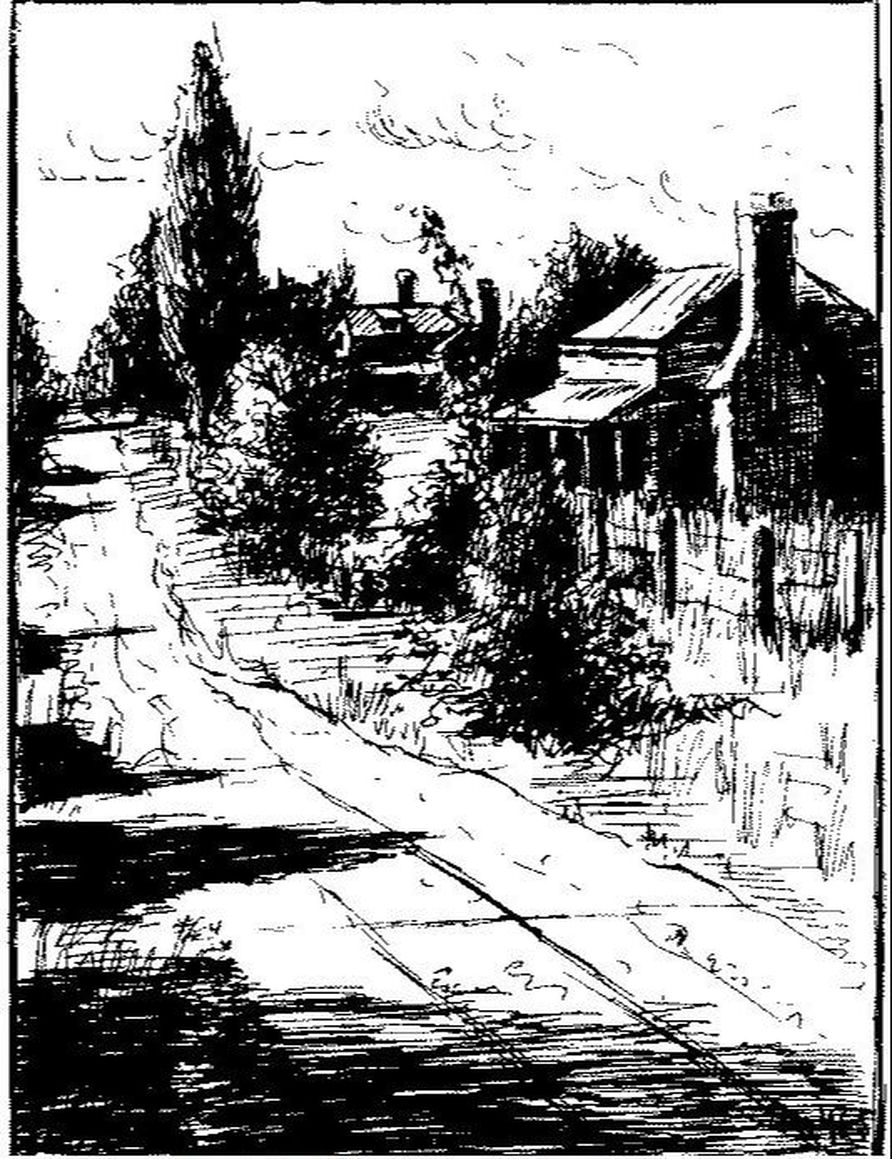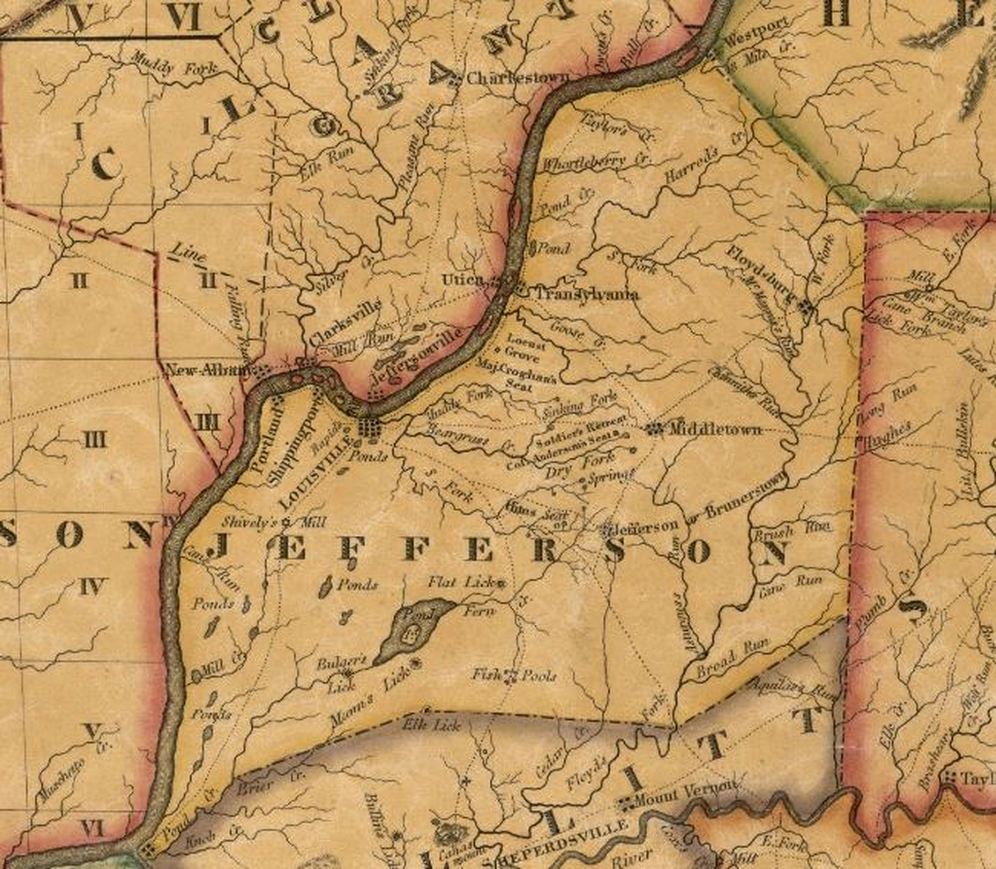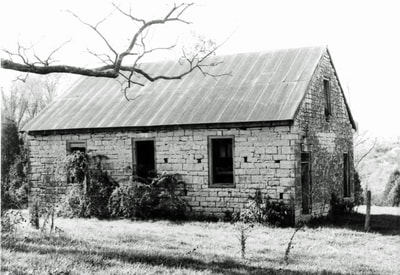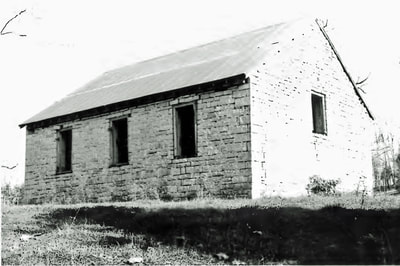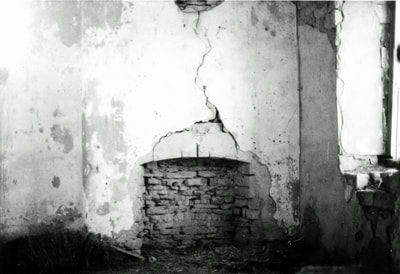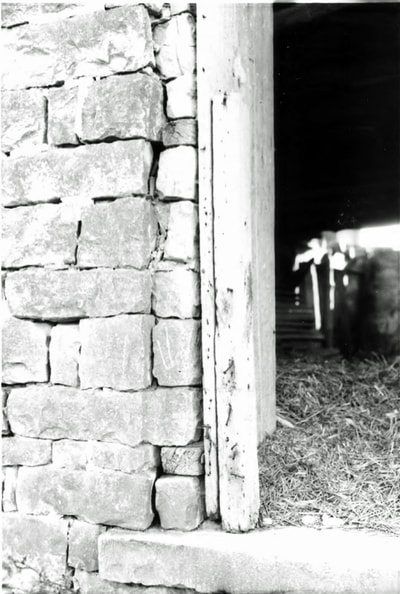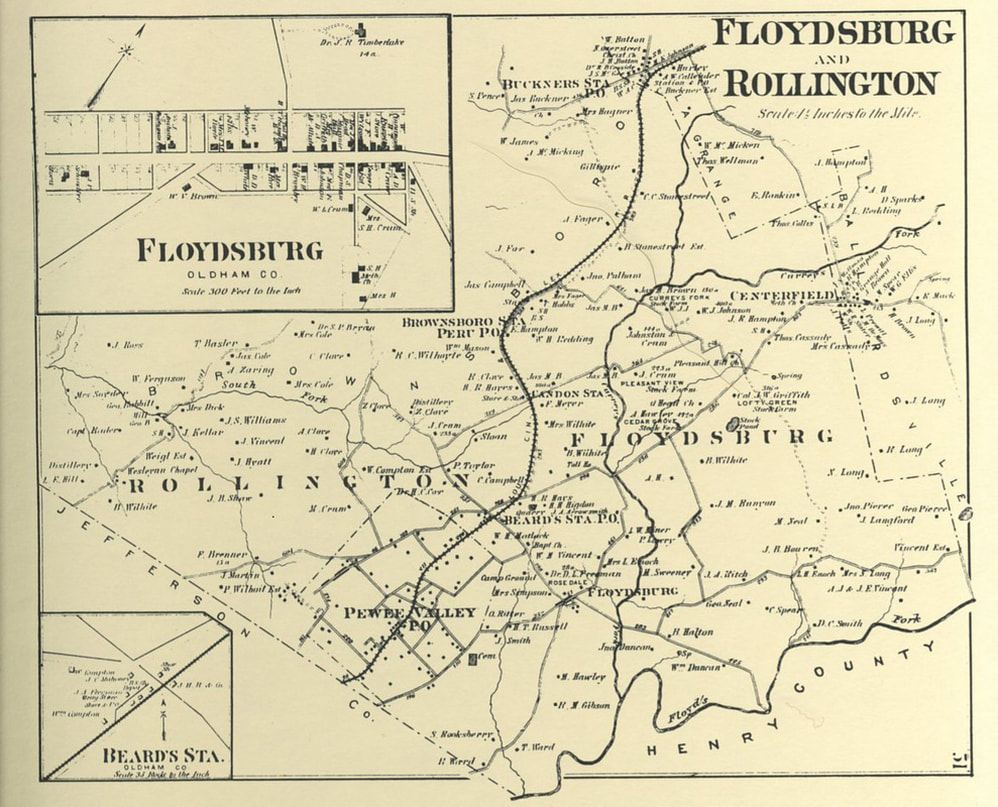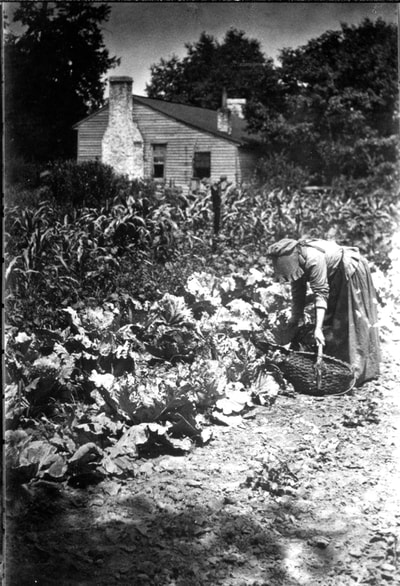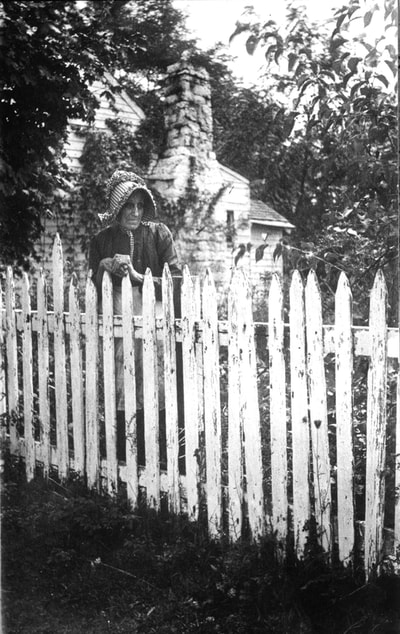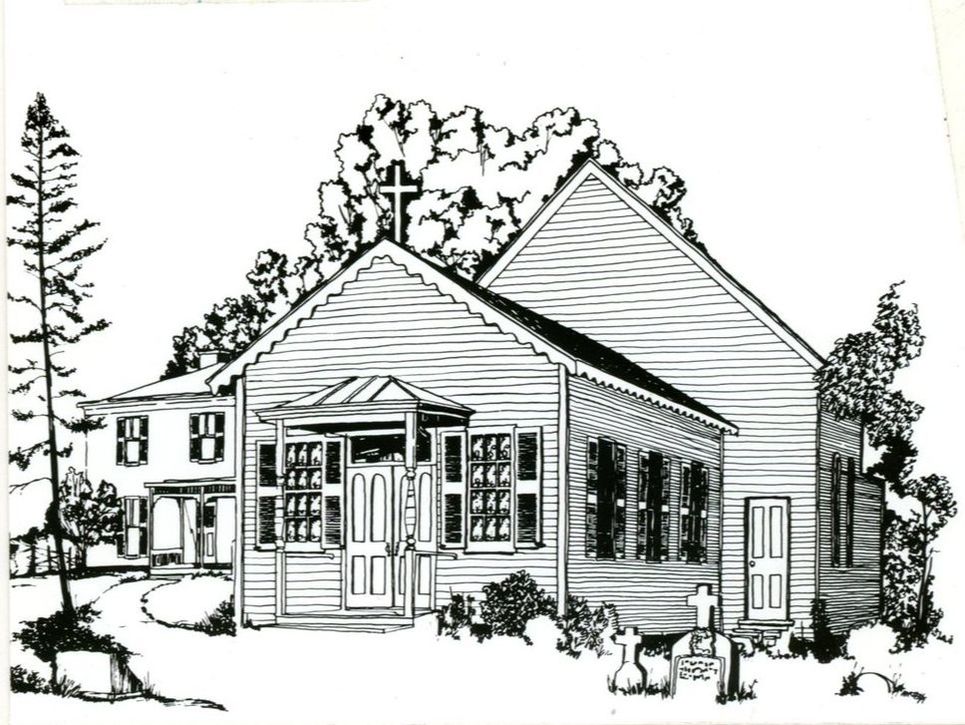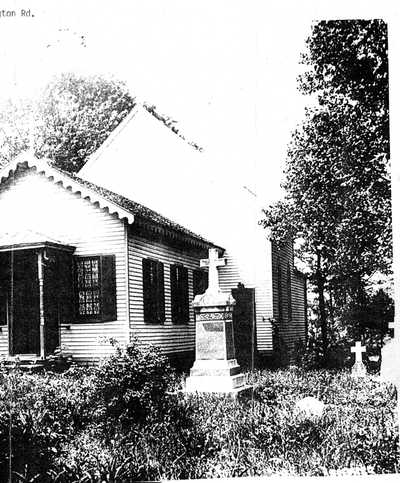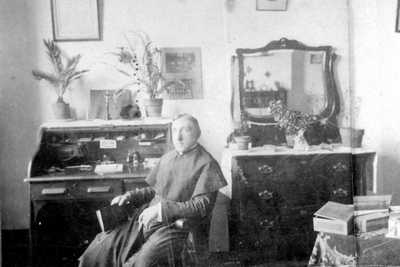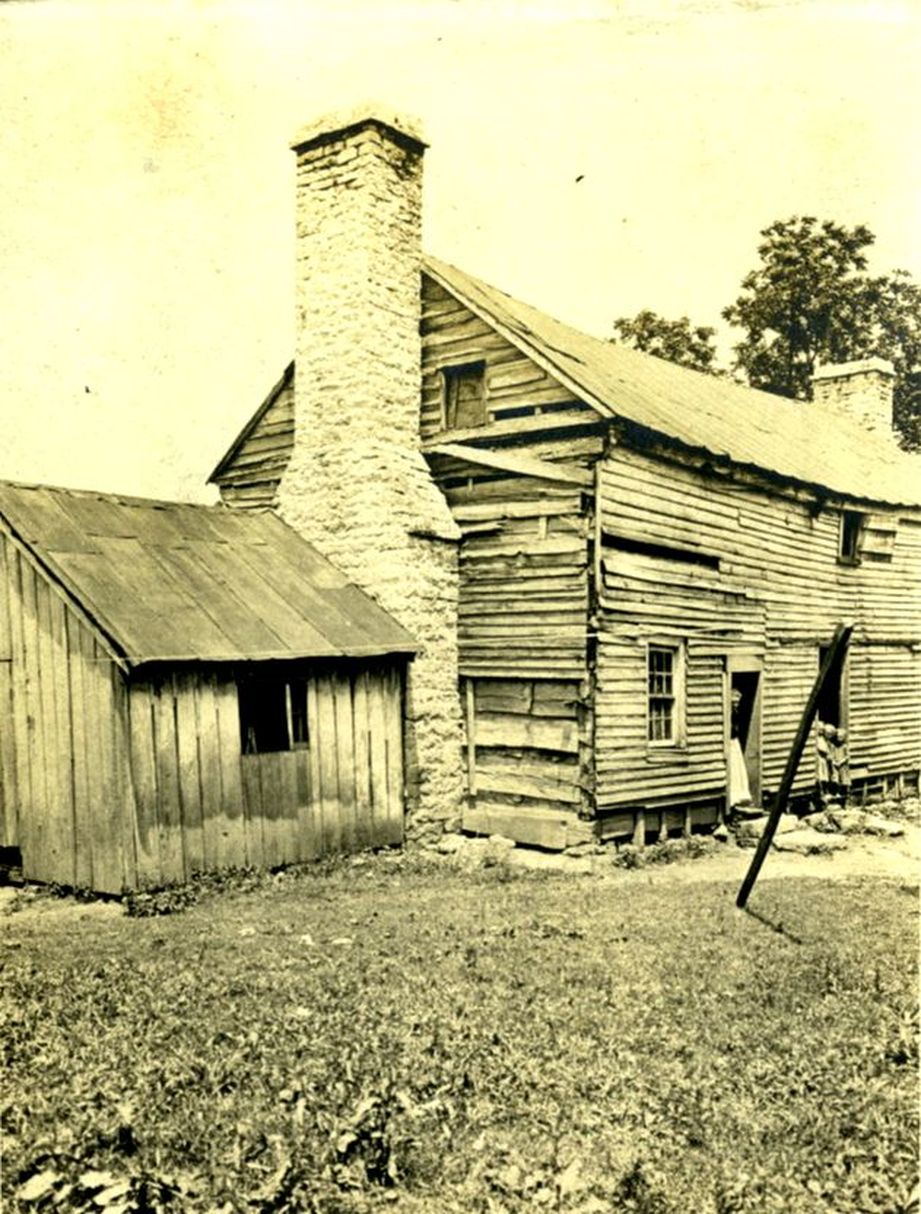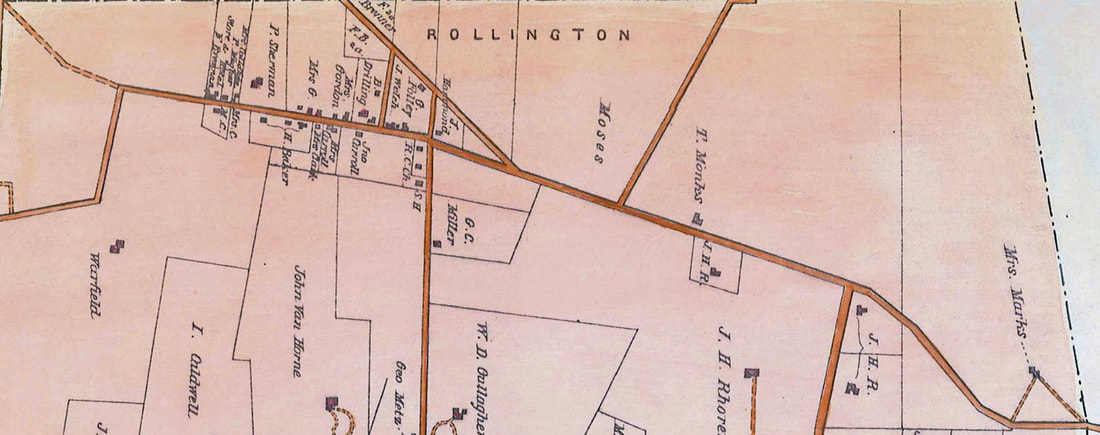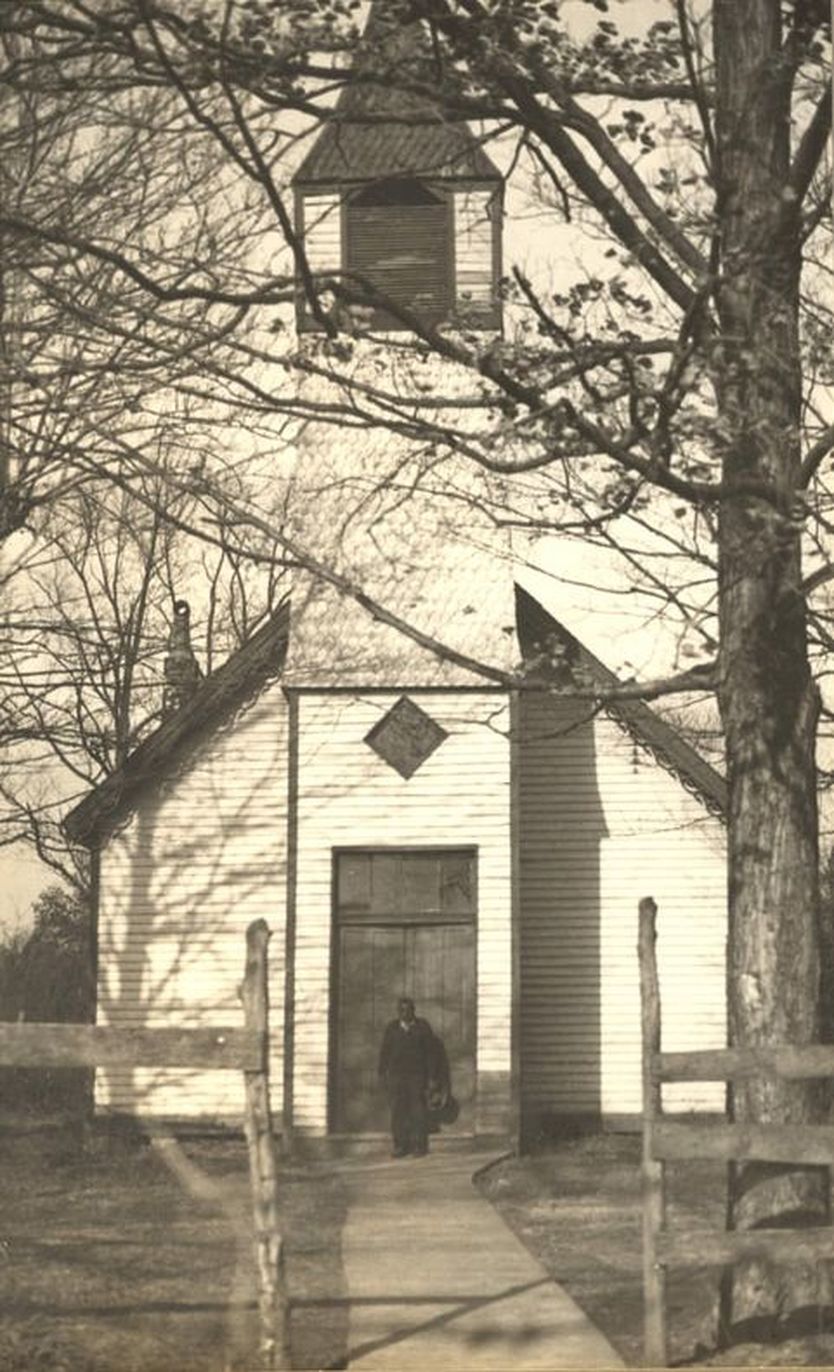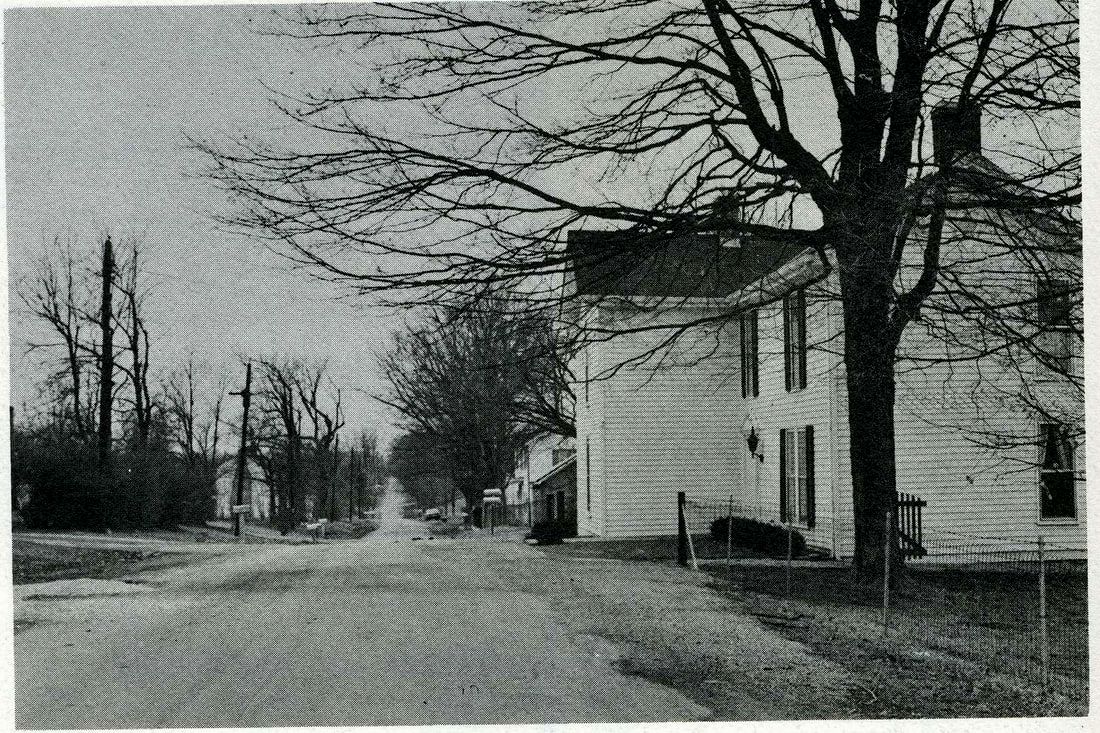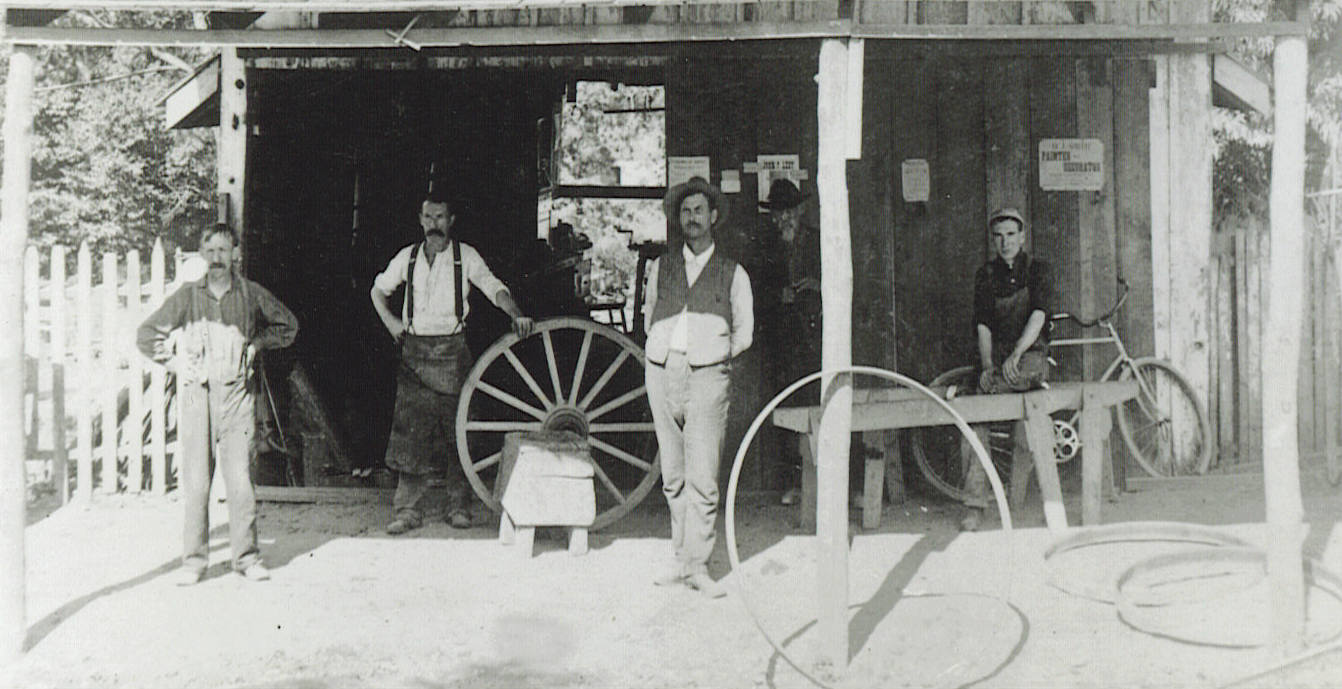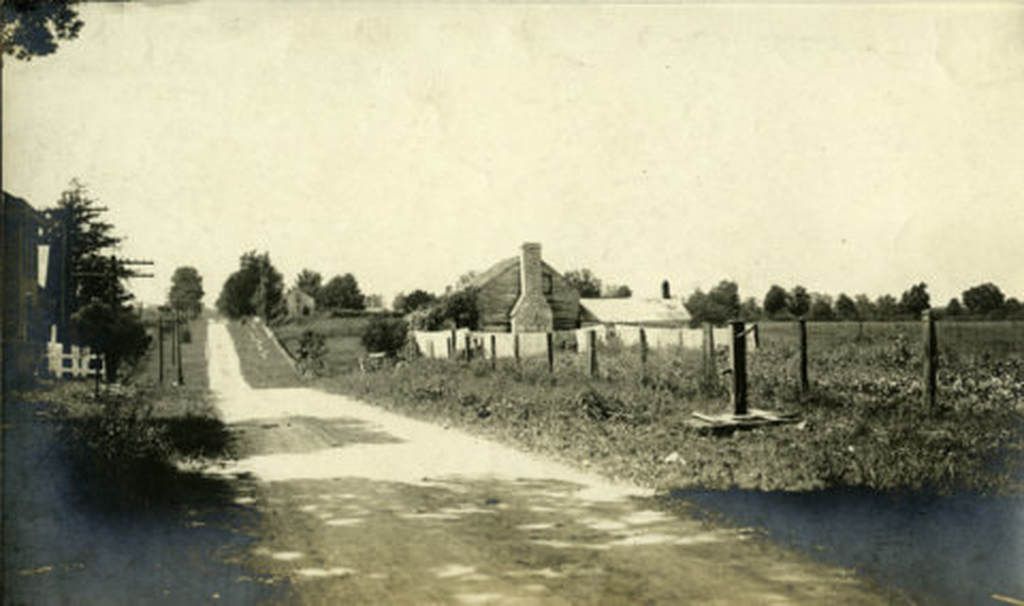Rollington
“Long before Pewee Valley began developing as a community, Rollington had established itself as a settlement and overnight stop on the road between Louisville and Brownsboro,” says “A Place Called Pewee Valley.”
Rollington and Floydsburg were actually the first two major pioneer settlements in the southwestern corner of what is now Oldham County, predating Pewee Valley’s 1870 incorporation by at least half a century. Of the two pioneer communities, Floydsburg was older and was already a town when cartographers completed the map below of Jefferson County in 1818,
Rollington and Floydsburg were actually the first two major pioneer settlements in the southwestern corner of what is now Oldham County, predating Pewee Valley’s 1870 incorporation by at least half a century. Of the two pioneer communities, Floydsburg was older and was already a town when cartographers completed the map below of Jefferson County in 1818,
1810s: Settlers Start to Arrive
The Rollington community started developing in the 1810s, after Norburn Beall began selling off tracts of the 4,000-acre land grant he had inherited from his father. Early settlers in the area came primarily to farm, and many brought slaves. Heads of households on the 1820 census included:
|
Head of Household Name John Piner William Piner Judith Piner William Flint Martin Flint Jesse Yager Abraham Clore Isa Duenn Owen Gwathney Gabriel Stone Washington Williams Thomas Ingram Jacob Souther Ross Reuben Edward Penell John Penell John Carder John Harding Henry Harding William Tap Larkin Wilhoite Jesse Wilhoite Joel Goodman Robert W. Lewis Evan Wilhoite John Penell George McDaniel John Reynold Asa McGee Jason Wood Henry Netherton William Morris Jason Shrader William Shake Frederick Boyers Jacob Shake John Wigal John Shrader Michael Henderlider John W. Smith William Bryers Lewis Wilhoite Jesse Parker Richard Thomas Ann Hardin |
No. Whites 2 8 3 7 8 10 10 2 2 4 6 3 10 10 3 3 6 6 6 7 5 5 8 9 11 4 5 5 5 10 7 15 5 5 3 13 10 6 13 7 10 2 7 7 3 |
No. Slaves 1 4 3 0 1 8 13 0 14 0 12 17 8 1 1 0 4 1 1 0 1 21 0 15 3 1 7 0 3 15 3 0 10 0 0 0 0 13 0 0 0 4 8 0 12 |
1824: First Church, Wesley Methodist Chapel, Established
By 1824, Rollington area residents had built their first church: Wesley Methodist Chapel. According to "History & Families of Oldham County: The First Century 1824-1924," published by the Oldham County Historical Society (Turners Publishing Company, Paducah, Ky.; 1996), pp. 81-82:
The chapel was build in 1824 from stone hauled from around the countryside by Silas Babbitt (a young preacher and stone mason), with the help of Bruce Jean. It is approximately 44 feet long and 12 feet high. The walls are two feet thick. It is built of large hand-hewn stones which were fitted together. Yellow poplar was used in the rafters, which are marked with Roman numerals. The ax-marks are evident.
When this church was in its pioneer beginnings, it is likely that William McKendree, a well-known preacher of the Methodist Church in Oldham County, preached in the old log meeting house. After the stone chapel was erected, it is probable that the first ordained minister to preach there was Rev. Ruben Ross, who lived in the Brownsboro community. Folklore has it that this stone chapel served as a fortress for the pioneers fleeing from the Indians who were active in the area. The settlers crowded into the chapel and waited for the Indians to depart the area.
The last service was held in 1892 and conducted by P.J. Ross. (The new Methodist Church was dedicated on a site that was part of the Lou Wilhite place on Highway 22.)
We do know that for a period after the chapel was no longer being used as a church, it was used as a school. Mr. Z.G. King taught there for many years. Children came from all over the countryside to be taught. All eight grades were taught in the same classroom.
This chapel has survived into the 20th century because of the sensitivity of Mr. and Mrs. Carl Haunz, who own the farm on which it stands. The Haunz family has owned it for many generations.
In 1984, the chapel was placed on the National Register of Historic Places. The nomination form noted that the land for the chapel was originally deeded to the church by Jacob Shrader and was sold in 1903 by W.H. Maddox to Fred Haunz. Also noted was that, "Early Jefferson County Minute books refer to the site as 'Camp Ground' perhaps because of early 19th century revivals."
The chapel was build in 1824 from stone hauled from around the countryside by Silas Babbitt (a young preacher and stone mason), with the help of Bruce Jean. It is approximately 44 feet long and 12 feet high. The walls are two feet thick. It is built of large hand-hewn stones which were fitted together. Yellow poplar was used in the rafters, which are marked with Roman numerals. The ax-marks are evident.
When this church was in its pioneer beginnings, it is likely that William McKendree, a well-known preacher of the Methodist Church in Oldham County, preached in the old log meeting house. After the stone chapel was erected, it is probable that the first ordained minister to preach there was Rev. Ruben Ross, who lived in the Brownsboro community. Folklore has it that this stone chapel served as a fortress for the pioneers fleeing from the Indians who were active in the area. The settlers crowded into the chapel and waited for the Indians to depart the area.
The last service was held in 1892 and conducted by P.J. Ross. (The new Methodist Church was dedicated on a site that was part of the Lou Wilhite place on Highway 22.)
We do know that for a period after the chapel was no longer being used as a church, it was used as a school. Mr. Z.G. King taught there for many years. Children came from all over the countryside to be taught. All eight grades were taught in the same classroom.
This chapel has survived into the 20th century because of the sensitivity of Mr. and Mrs. Carl Haunz, who own the farm on which it stands. The Haunz family has owned it for many generations.
In 1984, the chapel was placed on the National Register of Historic Places. The nomination form noted that the land for the chapel was originally deeded to the church by Jacob Shrader and was sold in 1903 by W.H. Maddox to Fred Haunz. Also noted was that, "Early Jefferson County Minute books refer to the site as 'Camp Ground' perhaps because of early 19th century revivals."
Less than a decade after Wesley Methodist Chapel was built, the Baptists tried to establish a church. According to "A History of Kentucky Baptists: From 1769 to 1885, Including More Than 1800 Biographical Sketches, Volume 2" by Burrilla B. Spencer and J. R. Baumes (1886), a Baptist church was started in the area in 1833, but was dissolved just three years later, perhaps foreshadowing Rollington's later reputation for drinking and carousing!
1847: Rollington Becomes a Town
On April 5, 1836, the community purchased a quarter-acre of land for $12.50 from Hiram and Eliza Ritter. Their goal was to erect a school and meetinghouse. Trustees for the property were John Shrader, Jacob Shake, Calvin E. Stoddard and John Logan. It would take another 11 years, however, before Rollington was officially incorporated. On January 9, 1847, the Kentucky State Legislature passed an act to establish the town of Rollington. Among the original trustees was Henry Smith, who was later instrumental in developing Pewee Valley:
AN ACT to establish the town of Rollington, in Oldham county.
Sec. 1. Be it enacted by the General Assembly of the Commonwealth of Kentucky, That the village called and known be laid out, & by the name of Rollington, in Oldham county, shall be and the same is hereby incorporated as a town; to be designated and known as the town of Rollington; and having for its boundary the full extent of all the lots already laid off in said village, and such as may hereafter be laid off under the provisions of this act.
Sec. 2. That Henry Smith, John Willis, William Shake, Jacob Shake, and Elisha B. King, are hereby appointed and constituted Trustees for said town: who shall continue in office until the first Monday in March, eighteen hundred and forty eight, and until their successors are duly elected and qualified.
Sec. 3. That it shall be the duty of said Trustees, at any time before the third Monday in May next, to have a surveyof said town made, and a plat thereof returned to the Clerk of the Oldham County Court; and such quantity of land, not exceeding fifty acres, as said Trustees may deem proper, including the present lots and adjoining land, shall, with the consent of the proprietors, be laid off into lots, streets, and alleys, and constitute the limits and boundary of said town: Provided, That, in laying off said streets and alleys, said Trustees shall, as far as practicable, lay them off upon the dividing lines of the present lots and lands adjoining, to the end that the ground necessary for public use shall be taken off of proprietors as equally as may be: And, provided further, That the streets and alleys, so laid off, shall vest in said Trustees and their successors for public use; but the title to the lots shall remain in the proprietors thereof.
Sec. 4. That the Trustees of said town shall have power, from time to time, to appoint one of their own body as Chairman; and appoint their Clerk, Treasurer, Assessor, and Collector, and every other officer they may deem necessary for the internal regulation of said town. That the Clerk shall, on the first Monday in March, eighteen hundred and forty eight, and on the first Monday of every March following, hold an election for five Trustees of said town, who shall hold their office until the first Monday in March following their election, and until their successors shall be elected and qualified. The Trustees, thus elected, shall, before they act, be duly sworn before a Justice of the Peace, faithfully to perform the duty of Trustee; and the said Trustees shall have power and authority to pass and enforce all by-laws, fill all vacancies that may occur in their Board, and do any and every act for the regulation and government of said town, which the Trustees of towns are authorized to do under the general laws of this Commonwealth in relation to towns.
Sec. 5. That the Trustees of said town may, annually, levy a tax upon the property and inhabitants of said town; and all property, both real and personal, within the limits of said town, subject to taxation under the revenue laws of this Commonwealth, shall be subject to taxation by the Trustees of said town; and the sum hereby authorized to be raised shall be appropriated to the improvement of said town, and for such other purposes as the Trustees may direct: Provided, That the amount raised shall not exceed two hundred dollars in any one year.
Sec. 6. That no person shall be elected a Trustee of said town, unless he shall be an inhabitant thereof, or an owner of real property therein; and every white male over the age of twenty one years, liable to taxation by the foregoing provisions, shall have the right to vote at the election of Trustees.
Sec. 7. That the Trustees of said town shall have full power to enforce and recover fines for any sum of money not exceeding ten dollars, for any breach of their by-laws; which fine or fines may be recovered before any Justice of the Peace of Oldham county, in the name of the Commonwealth of Kentucky, for the use of the Trustees of said town; the fines to be used and appropriated in the same manner as the money raised by taxation: Provided, however, That any fines assessed for a violation of any of the existing laws of this Commonwealth, shall be appropriated as other fines are now, by law, directed.
Sec. S. That all Assessors, Collectors and Treasurers, appointed by said Trustees and their successors, shall each be required to give bond, in such sums as said Trustees may think proper, with security to the Trustees, for the faithful performance of their respective duties, before they shall be allowed to act.
Approved January 9, 1847.
Sec. 1. Be it enacted by the General Assembly of the Commonwealth of Kentucky, That the village called and known be laid out, & by the name of Rollington, in Oldham county, shall be and the same is hereby incorporated as a town; to be designated and known as the town of Rollington; and having for its boundary the full extent of all the lots already laid off in said village, and such as may hereafter be laid off under the provisions of this act.
Sec. 2. That Henry Smith, John Willis, William Shake, Jacob Shake, and Elisha B. King, are hereby appointed and constituted Trustees for said town: who shall continue in office until the first Monday in March, eighteen hundred and forty eight, and until their successors are duly elected and qualified.
Sec. 3. That it shall be the duty of said Trustees, at any time before the third Monday in May next, to have a surveyof said town made, and a plat thereof returned to the Clerk of the Oldham County Court; and such quantity of land, not exceeding fifty acres, as said Trustees may deem proper, including the present lots and adjoining land, shall, with the consent of the proprietors, be laid off into lots, streets, and alleys, and constitute the limits and boundary of said town: Provided, That, in laying off said streets and alleys, said Trustees shall, as far as practicable, lay them off upon the dividing lines of the present lots and lands adjoining, to the end that the ground necessary for public use shall be taken off of proprietors as equally as may be: And, provided further, That the streets and alleys, so laid off, shall vest in said Trustees and their successors for public use; but the title to the lots shall remain in the proprietors thereof.
Sec. 4. That the Trustees of said town shall have power, from time to time, to appoint one of their own body as Chairman; and appoint their Clerk, Treasurer, Assessor, and Collector, and every other officer they may deem necessary for the internal regulation of said town. That the Clerk shall, on the first Monday in March, eighteen hundred and forty eight, and on the first Monday of every March following, hold an election for five Trustees of said town, who shall hold their office until the first Monday in March following their election, and until their successors shall be elected and qualified. The Trustees, thus elected, shall, before they act, be duly sworn before a Justice of the Peace, faithfully to perform the duty of Trustee; and the said Trustees shall have power and authority to pass and enforce all by-laws, fill all vacancies that may occur in their Board, and do any and every act for the regulation and government of said town, which the Trustees of towns are authorized to do under the general laws of this Commonwealth in relation to towns.
Sec. 5. That the Trustees of said town may, annually, levy a tax upon the property and inhabitants of said town; and all property, both real and personal, within the limits of said town, subject to taxation under the revenue laws of this Commonwealth, shall be subject to taxation by the Trustees of said town; and the sum hereby authorized to be raised shall be appropriated to the improvement of said town, and for such other purposes as the Trustees may direct: Provided, That the amount raised shall not exceed two hundred dollars in any one year.
Sec. 6. That no person shall be elected a Trustee of said town, unless he shall be an inhabitant thereof, or an owner of real property therein; and every white male over the age of twenty one years, liable to taxation by the foregoing provisions, shall have the right to vote at the election of Trustees.
Sec. 7. That the Trustees of said town shall have full power to enforce and recover fines for any sum of money not exceeding ten dollars, for any breach of their by-laws; which fine or fines may be recovered before any Justice of the Peace of Oldham county, in the name of the Commonwealth of Kentucky, for the use of the Trustees of said town; the fines to be used and appropriated in the same manner as the money raised by taxation: Provided, however, That any fines assessed for a violation of any of the existing laws of this Commonwealth, shall be appropriated as other fines are now, by law, directed.
Sec. S. That all Assessors, Collectors and Treasurers, appointed by said Trustees and their successors, shall each be required to give bond, in such sums as said Trustees may think proper, with security to the Trustees, for the faithful performance of their respective duties, before they shall be allowed to act.
Approved January 9, 1847.
Sara Russell at Work in her Home Garden in Rollington
1851: The Louisville & Frankfort Railroad Is Completed
Completion of the Louisville & Frankfort Railroad in August 1851 brought a wave of new residents to the area who were far different than the farm families who settled Rollington. In 1854, the L&F inaugurated an Accommodation Train service, which allowed wealthy Louisville businessmen to commute back and forth to work each day. Most built homes closer to the tracks, rather than buying land along the turnpike.
The new community developed its own identity, separate from Rollington, and in 1858 adopted the name "Pewee Valley." Those new residents haled from the big city and were not at all impressed by the rustic charms of Rollington's log cabins, public inn and small stores had to offer. Noble Butler made a sarcastic salute to the inn in a poem he submitted anonymously to the July 5, 1858 Louisville Daily Courier:
...But no matter, here’s a paean
To whatever is Peweean;
To that Athens-mirroring town,
Rollington, with all its peoples,
“Publicinn,” and tall church steeples,****
And Lord Mayor Tumbledown...
Another unflattering reference to Rollington appeared in an 1866 anecdote published in the Editors Drawer in Harper's Magazine (Volume 32, 1866, page 816). It was written about a party at the William C. Allen home, which was located in Rollington at that time:
... You knew Mr. Allen, the artist, a man of genius and generosity unexcelled. In his lifetime he used to assemble at his house, that overlooks the metropolitan splendors of Rollington, Kentucky, a goodly gathering of guests, who smoked long-handled pipes, made bad puns, asked unanswerable conundrums and in a generally jolly way made much of one another...
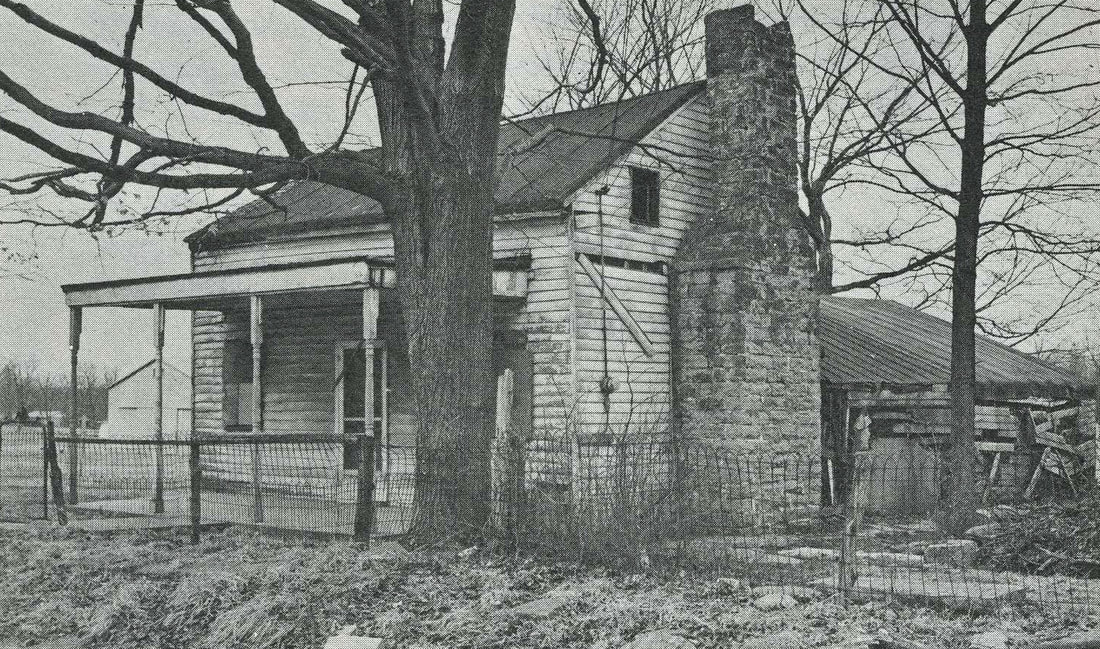
Old inn at Rollington in 1970. New residents such as Edwin Bryant, Thomas Smith, Noble Butler and Walter Haldeman were used to the far fancier and much larger accommodations offered by the Louisville Hotel and the Galt House. From "A Place Called Pewee Valley" published by the Pewee Valley Centennial Commission in 1970. The Inn has since been torn down.
1865: St. Aloysius Catholic Church Arrives
Catholicism was late to establish a presence in the area. Although the Cathedral of Louisville sent missions, it was not until 1865 that St. Aloysius Catholic Church was built on the same ground as a cemetery the Catholics had established in Rollington in 1863. And it took another eight years for Pewee Valley/Rollington to became an official parish. That occurred in 1871 -- the year after the Town of Pewee Valley was officially incorporated.
The church eventually relocated to Railroad Avenue/Mt. Mercy Drive in 1914. The old church building was moved across the road and used to build a new home. And the cemetery remains on the corner of Central Avenue and Rollington Road today.
The church eventually relocated to Railroad Avenue/Mt. Mercy Drive in 1914. The old church building was moved across the road and used to build a new home. And the cemetery remains on the corner of Central Avenue and Rollington Road today.
1867-1868: Louisville and Brownsboro Turnpike Branch Completed Connecting Rollington to Pewee Valley
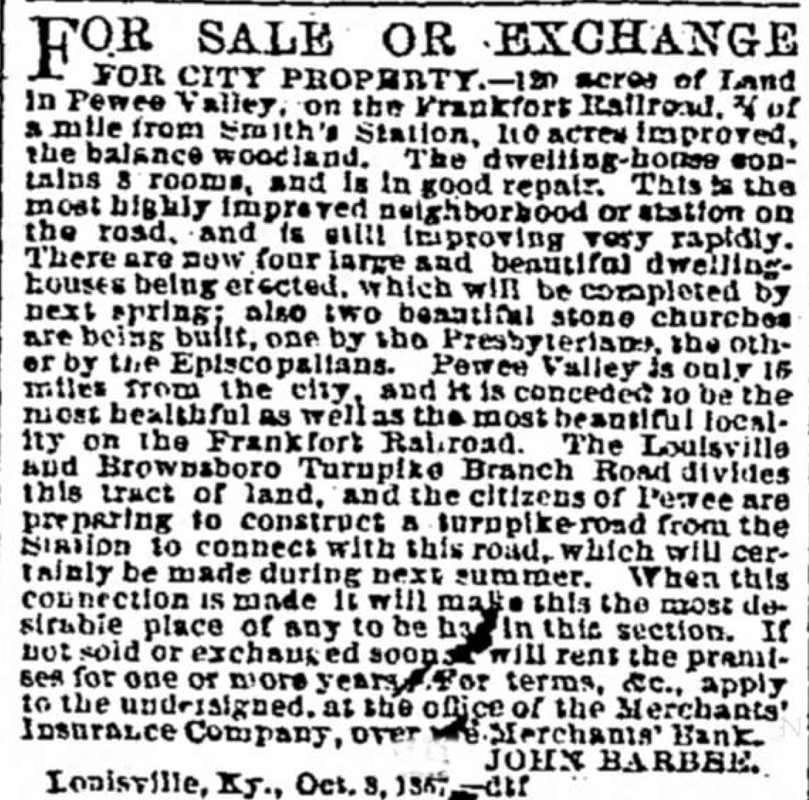
This real estate ad run by John Barbee in the October 10, 1867 Courier-Journal talks about the building of the turnpike road to connect Rollington with the railroad station in Pewee Valley. That section of road, called the Worthington-Pewee Valley Road in 1939, is now State Road 362 and is part of Central Avenue.
In 1867, a group of enterprising Peweeans banded together and paid to build a train depot at Smith's Station. That spurred the construction of a new road -- the "Louisville and Brownsboro Turnpike Branch" -- connecting Rollington to the station. In the fall of 1867, the turnpike branch was in the planning stages with completion anticipated by the summer of 1868.
Over the intervening century and a half, the old Louisville and Brownsboro Turnpike Road morphed into State Highway 362. Today, the stretch between Highway 22 and the three-way stop at Peace Lane is part of Pewee Valley's Central Avenue.
1868: Frederick Brenner's Tavern Becomes the Voting Place for Rollington Residents
§Acts Passed at the ... Session of the General Assembly for the Commonwealth of Kentucky, Volume 1, J. Bradford, printer to the Commonwealth, 1868
CHAPTER 1183.
AN ACT to change the voting place in the Rollington Precinct of Oldham County
Be it enacted by the General Assembly of the Commonwealth of Kentucky:
§ 1. That hereafter the voting place in the Rollington precinct, in Oldham County, shall be the tavern house of F. Brenner, in said precinct.
§ 2. This Act shall take effect from and after it passage.
Approved May 9, 1868
CHAPTER 1183.
AN ACT to change the voting place in the Rollington Precinct of Oldham County
Be it enacted by the General Assembly of the Commonwealth of Kentucky:
§ 1. That hereafter the voting place in the Rollington precinct, in Oldham County, shall be the tavern house of F. Brenner, in said precinct.
§ 2. This Act shall take effect from and after it passage.
Approved May 9, 1868
1870: A Portion of Rollington Becomes Part of the Newly-Incorporated Town of Pewee Valley
1873: Sycamore Chapel, African American Baptist Church, Established and Freedmen Community at Frazier Town Begins Development
1882: Garrett Foley's Home Becomes the Voting Place for Rollington Residents
Acts of the General Assembly of the Commonwealth of Kentucky, 1882
CHAPTER 64. AN ACT to change the place of voting in Rollington precinct, in Oldham county.
Be it enacted by the General Assembly of the Commonwealth of Kentucky:
§ 1. That the place of voting in Rollington precinct, Oldham county, be, and the same is hereby, changed from the house of one Fred Brenner to the house now occupied and owned by Garret Foley, in the town of Rollington, and county aforesaid.
§ 2. This act shall take effect from its passage.
Approved January 19, 1882.
CHAPTER 64. AN ACT to change the place of voting in Rollington precinct, in Oldham county.
Be it enacted by the General Assembly of the Commonwealth of Kentucky:
§ 1. That the place of voting in Rollington precinct, Oldham county, be, and the same is hereby, changed from the house of one Fred Brenner to the house now occupied and owned by Garret Foley, in the town of Rollington, and county aforesaid.
§ 2. This act shall take effect from its passage.
Approved January 19, 1882.
Reminiscences of Rollington in the 1890s
While Pewee Valley was established as a suburb of Louisville, Rollington was a town in its own right and had a thriving commercial area along the turnpike. William Herdt, Sr., whose grandparents, Jacob and Carrie Lutz Herdt, arrived in Rollington in 1893 and operated a blacksmith and wagon shop in Pewee Valley on Central Avenue, halfway between Pewee Valley and Rollington, provided this glimpse of what Rollington was like at the turn of the 20th century during an interview conducted ca. 1970 for the town's Centennial project:
...There were many nice homes in the little town of Rollington then, also there was a pottery, a tin-shop, saw-mill, three taverns and a dress-making shop run by a Mrs. Walsh. Mr. Foley had a butcher shop in Rollington, which was later moved to a basement in the Louisville & Nashville Station at Pewee Valley. Later on it was moved in back of what is now Thompson's Grocery...
... In the olden days Rollington was a popular stop between Westport and Louisville, and later on, because of the many taverns, had a rather disreputable reputation...
... The children attended school at Wesley Chapel and had to walk to school through dense woods across South Fork, down through a marshy place which we now know as Lake Louisvilla. That vicinity was then called Martin's Bridge, and the old stone bridge is still there. The children wore boots to school as they has to wade through marshy land. They carried shoes with their books, and changed the boots for shoes when they reached school. Mr. Zilby Oliver King was the teacher of the one-room school in Wesley Chapel...Mr. Z.O. King taught at two schools in the same year in those days. He would teach several months each year in the Pewee Valley School, and then finish the year out in the Wesley Chapel School ...
Related Links

